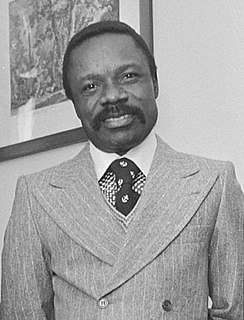A Quote by Omar Bongo
Globalization, far from putting an end to power diplomacy between States, has, on the contrary, intensified it.
Quote Topics
Related Quotes
The Constitution does not protect the sovereignty of States for the benefit of the States or state governments as abstract political entities, or even for the benefit of the public officials governing the States. To the contrary, the Constitution divides authority between federal and state governments for the protection of individuals.
We are so anxious to achieve some particular end that we never pay attention to the psycho-physical means whereby that end is to be gained. So far as we are concerned, any old means is good enough. But the nature of the universe is such that ends can never justify the means. On the contrary, the means always determine the end.
Far better to think historically, to remember the lessons of the past. Thus, far better to conceive of power as consisting in part of the knowledge of when not to use all the power you have. Far better to be one who knows that if you reserve the power not to use all your power, you will lead others far more successfully and well.












































